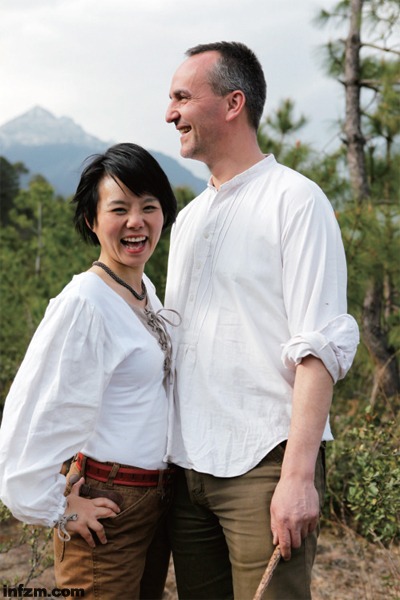China's music hedged in by rules
- By Wang Mengru
 0 Comment(s)
0 Comment(s) Print
Print E-mail China.org.cn, April 5, 2013
E-mail China.org.cn, April 5, 2013
|
|
|
Gong Linna with her music-producer husband Robert Zollitsch |
Robert Zollitsch, known as Lao Luo across China, is a 47-year-old expert in traditional Asian music who hails from Munich, Germany. He speaks Chinese, though with a German twist to it. He has been married twice; his former wife was Mongolian singer and songwriter Urna Chahar-Tugchi, and his present wife is Chinese folk singer Gong Linna, according to a recent report from Nanfang Weekly.
When Zollitsch came to China, people liked calling him Mr. Robert and Lao Luo, so he changed his first name to "Luo" (锣, a traditional Chinese instrument).
Zollitsch believes in the Chinese word "yuanfen" (which translates as serendipity). He thinks that he and Gong share a predestined relationship.
Gong's songs were all composed by Zollitsch. Growing up with Bavarian folk music, he studied traditional Chinese music and the Chinese guqin in Shanghai in 1993.
His compositions for traditional Chinese instruments make extensive use of harmonies, fusing together elements of different cultures, which leads to music that seems to be of the traditional Chinese art approach with a Western influence.
His love of reading and writing traditional Chinese poems has enabled him to compose music and write lyrics using lines from famous poems such as Tang Dynasty poet Li Bai's "Jing Ye Si" ("Thoughts on a Still Night") and Bai Juyi's "Ye Xue" ("Night Snows").
By using ancient Chinese poems as lyrics and combining the yangqin, sheng, cello, ruan and accordion, Gong's songs have been a sensation across Europe and Southeast Asia since 2002.
Gong became an internet sensation for her lyric-less song "Tan Te," or "Disturbed." With her powerful voice, wide vocal range and dramatic facial expressions, she is now known as an unconventional Chinese folk singer who breaks all the rules.
Gong's latest songs "Fa Hai, You Don't Understand Love" and "Jin Gu Bang" ("Golden Stick") composed by Zollitsch, caused another wave of attention and controversy. The songs' melodies and lyrics are both direct and simple. However, some people have criticized the songs for being boring, shocking and nonsensical.
Because 2013 is the Year of the Snake in the Chinese zodiac, Zollitsch said he wanted to write a song about a snake. "The Legend of the White Snake" is a popular fairytale in China and the White Snake spirit is considered to be both beautiful and good-hearted. "The song is about breaking through the obstacles and finding love, which is an eternal theme," he said.
Despite the different views expressed by critics and fans, Gong and Zollitsch stick to their way of exploring "new China's folk music." With the help of her husband, Gong has broken all the rules of traditional Chinese folk singing, ended her struggles as a Chinese folk singer and found her second breath.
"China's music is hedged in by rules and regulations; musicians should break them," Zollitsch said, "Chinese stir-fry is so creative. Although the tomato, courgette and onion are originally from abroad, Chinese people can cook well. Same goes for music."
"I feel so lucky to be with Gong. I am living off her performing fees, because I can receive no rewards as a composer in China," he added.







Go to Forum >>0 Comment(s)